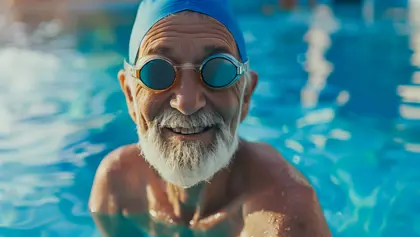Read more
HSO in Public Sector
Ryman Healthcare’s Retirement Village Games
Using augmented reality and Artificial Intelligence, we’ve been able to aid Ryman in holding a variety of sporting events.

We’ve been utilising emerging technologies to produce some pretty unique solutions for years. But an age-defying Olympic competition across two countries is not something we expected to help out with. Olympics@Ryman, as it has been dubbed, was Ryman Healthcare’s brilliant idea to increase engagement for thousands of their residents all across New Zealand and Australia.
Using augmented reality and Artificial Intelligence, we’ve been able to aid Ryman in holding a variety of sporting events – lawn bowls, a walking relay, cycling races, swimming races, and even “quiznastics”. The events were a major hit, not only allowing residents to create new memories and improve both their physical and mental health, but also giving us a chance to test technologies that could continue to improve the lives of residents for years to come.
Medal-winning idea
Ryman Healthcare is a pioneer of the retirement village industry, having introduced the concept to New Zealand four decades ago. Across its 42 villages in Australia and New Zealand (with more on the way), it strives to provide the best possible lifestyles for its residents.
With the emergence of COVID-19 and lockdown in March and April 2020, Ryman stepped up its engagement with residents dramatically, recognising the anxiety and isolation that could have resulted in such uncertain times. But after the vaccination rollouts started happening and the outlook was looking more settled, the company was determined not to lose that level of engagement. Even better, after focusing on safety for so long, Ryman’s leaders wanted to bring fun back to every interaction.
“We wanted to find a way to embrace technology that enabled people to be more physically active and engaged together,” says Mary-Anne Stone, Chief Strategy Officer at Ryman explains. As a joint executive working group plotted the launch of Ryman’s new digital innovation strategy, talk turned (as it so often does) to sports – the upcoming Olympic Games. Then they had a medal-winning idea.
Was it possible for Ryman to host its own games, harnessing the latest technology to enable aspiring athletes from across all its villages to compete against each other? That brainwave got the (virtual) ball rolling for the world’s first ever international game of lawn bowls played on both sides of the Tasman – and a whole lot more.
“Ryman is a company that will over-invest in resident experiences. We want to continue to lead and take advantage of emerging technology and digital innovation to deliver even better experiences for our residents.”

Selecting the winning events
As digital specialists, we have a track record in exploring technology for positive ageing. The brief from Ryman jolted our team into action like a starter pistol, inspiring us to develop a whole stadium-full of games that could be adapted for digital connectivity. However, there were some special considerations. After devising a list of 12 potential activities, our team then worked alongside Ryman to identify the most practical ones.
First of all, the games had to be suitable for a whole range of participants – average age 83 – to get as many people as possible involved, which ruled out more skilled (or dangerous) sports. Gymnastics, synchronised swimming, boxing, and equestrian events – scratched.
The events chosen also had to be easy to judge and organise across 42 different locations. While Internet of Things (IoT) connected devices and mixed reality HoloLens headsets were available, their supply wasn’t limitless. That meant slightly more complicated games like golf didn’t make it across the finish line either. Five events made the final selection – lawn bowls, 30m breaststroke, a six-member half marathon walking relay, 10km bike race and (for the less sporty types), a digital quiz.

Relay walking virtual Mt. Fuji
Next came the question of how to enable everyone’s progress and position in their various locations to be mapped and monitored in real time. Our solution was to equip every village with Microsoft Surface devices loaded with PowerApps, which were not only hugely useful for managing registrations, health and safety information, and inputting scores, they also showed competitors a view of a real hiking trail on Mt. Fuji and mapped their progress on screen as if they were really in Japan. Pools had digital touchpads installed to enable winners to be identified, and relay time trials could either be run outside or on a treadmill with the aid of smart IoT trackers.
“We took a real agile approach, with constant changes each day to refine our ideas and get them working in reality. Designing the technology, deploying it across all locations across the Tasman and communicating the rules is a big job, and we wanted to make it as easy as possible for the Ryman team,” says Brandon Hutcheson, CEO of Aware Group (an HSO company).
Probably the most creative solutions were those used to host the bike race, relay walks, and lawn bowls events. Obviously, it’s not easy to ensure competitors around the country are cycling on a level playing field, so to speak. So stationary bikes were programmed with the same “hills” and speed levels for every rider, increasing resistance automatically as riders reached the “inclines” and speeding up for downhill stretches. Meanwhile, the cyclists themselves could experience cycling through a virtual Japanese landscape.
To enable the lawn bowls events, real greens in Hamilton and Christchurch were set up with digital cameras. Every time a player bowled, Microsoft artificial intelligence (AI) technology could map the position of each bowl onto a HoloLens mixed reality headset worn by an Aware Group bowls official on the opposing team’s green. The official could then place bowls in the exact location they landed in the real world, in a synchronised dance between bowlers and headset-wearing officials on both sides of the Tasman. Each team was shown the same view as the HoloLens on a Surface device at each location (to avoid dispute!). It sounds fiendishly complicated, but the technology we deployed on Microsoft Azure made the whole thing seamless.
““We took a real agile approach, with constant changes each day to refine our ideas and get them working in reality. Designing the technology, deploying it across all locations across the Tasman and communicating the rules is a big job.”

The epitome of pioneer spirit
The response from Ryman’s residents was phenomenal, with hundreds of people vying for selection via heats and time trials. “This was many residents’ first encounter with some of this technology. Seeing an avatar of themselves cycling past Lake Taupo and realising this was mirroring what they were doing in real life, was totally new. It’s been an extraordinary experiment,” says Mary-Anne.
The finals kicked off to coincide with the Olympic Games Tokyo 2020. Medals were on the line in each category, with everyone across Ryman’s villages able to follow their teams via live leaderboards in their community centres and online. Screenings were held each evening so people could come together and watch or view them on their own devices. While the world’s first remote lawn bowls international between New Zealand and Australia was unable to proceed owing to a COVID-19 lockdown in Victoria, the stage – or in this case, green – is now set for a trans-Tasman event in future.
“Ryman pride themselves on being pioneers and this couldn’t be a better demonstration of that spirit. This is a ground-breaking idea that’s bringing people together at a time when travel is all but impossible – full credit to Ryman and Aware Group for such an incredibly innovative use of technology. We’re delighted that Microsoft has been able to support this amazing achievement and none of us can wait to see what happens next. May the best team win!” says Matt Bostwick, Partner Director for Microsoft New Zealand.
Along with Ryman, we are now working on more ways to keep the games spirit alive once the events are over. Mary-Anne thinks the lawn bowls is likely to become a regular trans-Tasman fixture, and we are currently designing a solution that could enable teams to play against a robot.
“Maybe we’ll be able to play against more countries – we’d love to see greater use of holoportation through HoloLens devices and augmented reality support our wellbeing programmes going forward,” Mary-Anne says. “This combination of fitness and technology and social interaction is the future of resident care.”
Read more
HSO in Public Sector
We, and third parties, use cookies on our website. We use cookies to keep statistics, to save your preferences, but also for marketing purposes (for example, tailoring advertisements). By clicking on 'Settings' you can read more about our cookies and adjust your preferences. By clicking 'Accept all', you agree to the use of all cookies as described in our privacy and cookie policy.
Purpose
This cookie is used to store your preferences regarding cookies. The history is stored in your local storage.
Cookies
Location of Processing
European Union
Technologies Used
Cookies
Expiration date
1 year
Why required?
Required web technologies and cookies make our website technically accessible to and usable for you. This applies to essential base functionalities such as navigation on the website, correct display in your internet browser or requesting your consent. Without these web technologies and cookies our website does not work.
Purpose
These cookies are stored to keep you logged into the website.
Cookies
Location of Processing
European Union
Technologies Used
Cookies
Expiration date
1 year
Why required?
Required web technologies and cookies make our website technically accessible to and usable for you. This applies to essential base functionalities such as navigation on the website, correct display in your internet browser or requesting your consent. Without these web technologies and cookies our website does not work.
Purpose
This cookie is used to submit forms to us in a safe way.
Cookies
Location of Processing
European Union
Technologies Used
Cookies
Expiration date
1 year
Why required?
Required web technologies and cookies make our website technically accessible to and usable for you. This applies to essential base functionalities such as navigation on the website, correct display in your internet browser or requesting your consent. Without these web technologies and cookies our website does not work.
Purpose
This service provided by Google is used to load specific tags (or trackers) based on your preferences and location.
Why required?
This web technology enables us to insert tags based on your preferences. It is required but adheres to your settings and will not load any tags if you do not consent to them.
Purpose
This cookie is used to store your preferences regarding language.
Cookies
Why required?
We use your browser language to determine which language to show on our website. When you change the default language, this cookie makes sure your language preference is persistent.
Purpose
This service is used to track anonymized analytics on the HSO.com application. We find it very important that your privacy is protected. Therefore, we collect and store this data anonymously on our own servers. This cookie helps us collect data from HSO.com so that we can improve the website. Examples of this are: it allows us to track engagement by page, measuring various events like scroll-depth, time on page and clicks.
Cookie
Purpose
With your consent, this website will load Google Analytics to track behavior across the site.
Cookies
Purpose
With your consent, this website will load the Google Advertising tag which enables HSO to report user activity from HSO.com to Google. This enables HSO to track conversions and create remarketing lists based on user activity on HSO.com.
Possible cookies
Please refer to the below page for an updated view of all possible cookies that the Google Ads tag may set.
Cookie information for Google's ad products (safety.google)
Technologies Used
Cookies
Purpose
With your consent, we use IPGeoLocation to retrieve a country code based on your IP address. We use this service to be able to trigger the right web technologies for the right people.
Purpose
With your consent, we use Leadfeeder to identify companies by their IP-addresses. Leadfeeder automatically filters out all users visiting from residential IP addresses and ISPs. All visit data is aggregated on the company level.
Cookies
Purpose
With your consent, this website will load the LinkedIn Insights tag which enables us to see analytical data on website performance, allows us to build audiences, and use retargeting as an advertising technique. Learn more about LinkedIn cookies here.
Cookies
Purpose
With your consent, this website will load the Microsoft Advertising Universal Event Tracking tag which enables HSO to report user activity from HSO.com to Microsoft Advertising. HSO can then create conversion goals to specify which subset of user actions on the website qualify to be counted as conversions. Similarly, HSO can create remarketing lists based on user activity on HSO.com and Microsoft Advertising matches the list definitions with UET logged user activity to put users into those lists.
Cookies
Technologies Used
Cookies
Purpose
With your consent, this website will load the Microsoft Dynamics 365 Marketing tag which enables HSO to score leads based on your level of interaction with the website. The cookie contains no personal information, but does uniquely identify a specific browser on a specific machine. Learn more about Microsoft Dynamics 365 Marketing cookies here.
Cookies
Technologies Used
Cookies
Purpose
With your consent, we use Spotler to measures more extensive recurring website visits based on IP address and draw up a profile of a visitor.
Cookies
Purpose
With your consent, this website will show videos embedded from Vimeo.
Technologies Used
Cookies
Purpose
With your consent, this website will show videos embedded from Youtube.
Cookies
Technologies Used
Cookies
Purpose
With your consent, this website will load the Meta-pixel tag which enables us to see analytical data on website performance, allows us to build audiences, and use retargeting as an advertising technique through platforms owned by Meta, like Facebook and Instagram. Learn more about Facebook cookies here. You can adjust how ads work for you on Facebook here.
Cookies
Purpose
With your consent, we use LeadInfo to identify companies by their IP-addresses. LeadInfo automatically filters out all users visiting from residential IP addresses and ISPs. These cookies are not shared with third parties under any circumstances.
Cookies
Purpose
With your consent, we use TechTarget to identify companies by their IP address(es).
Cookies
Purpose
With your consent, we use this service provided by uMarketingSuite to run A/B tests across the HSO.com application. A/B testing (also called split testing) is comparing two versions of a web page to learn how we can improve your experience.
Purpose
With your consent, we use this service provided by uMarketingSuite to personalize pages and content across the HSO.com application. Personalization helps us to tailor the website to your specific needs, aiming to improve your experience on HSO.com.
Purpose
With your consent, we use ZoomInfo to identify companies by their IP addresses. The data collected helps us understand which companies are visiting our website, enabling us to target sales and marketing efforts more effectively.
Cookies